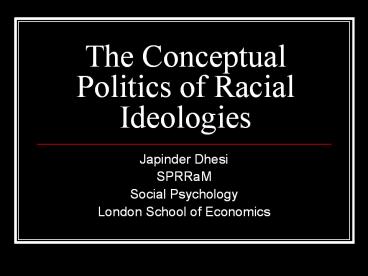The Conceptual Politics of Racial Ideologies
1 / 10
Title:
The Conceptual Politics of Racial Ideologies
Description:
... which guide the acquisition of information about certain phenomena from our ... and 'recovery' of older racial discourses as they are shaped into new ones. ... – PowerPoint PPT presentation
Number of Views:10
Avg rating:3.0/5.0
Title: The Conceptual Politics of Racial Ideologies
1
The Conceptual Politics of Racial Ideologies
- Japinder Dhesi
- SPRRaM
- Social Psychology
- London School of Economics
2
Cognition and Ideology
- Conventional social scientific accounts of
ideology fail to consider the psychological
component of ideologies (Van Dijk, 2005) - Increasingly, social scientists are acknowledging
the role played by cognitive factors in
maintaining social systems. - Key Question To what extent do psychological
predispositions lend racial ideologies their
conceptual fluency?
3
The Functions of Ideologies
- A key function of ideology to legitimate social
hierarchies such as race by naturalizing status
and power inequalities between social groups - The naturalization of race is a major factor
underlying the political potency of race to
organize power and authority - Stuart Hall observes race discovers what other
ideologies have to construct an apparently
natural and universal basis in nature itself
(1980 342) - Where does a naturalized notion of race come
from?
4
A Cognition and Culture Approach
- A widespread assumption in the social sciences
has been that human cognitive abilities are
domain-general i.e. they can be applied to any
empirical domain. - The Cognition and Culture perspective posits that
the human cognitive architecture contains a
number of innate cognitive structures which guide
the acquisition of information about certain
phenomena from our environment. - The Cognition and Culture perspective adopts an
epidemiology of representations approach to
culture (Sperber, 1994) - Cultural representations which trigger our
evolved cognitive architecture are more likely to
be acquired and transmitted than others.
5
Ideology A Cognition and Culture Approach
- In standard social scientific accounts
essentialism is described as a by-product of
certain philosophical and cultural traditions
(Fuss, 1989). - Cognition and Culture theorists have suggested
that essentialism is a property of the mind. - Psychological essentialism is an innate cognitive
predisposition which leads people to believe that
members of a category share a deep underlying
causal essence which confers their identity and
is responsible for many of their observable
features (perceptual and behavioural) (Medin
Ortony, 1989).
6
Ideology A Cognition and Culture Approach
- A distinction is made between metaphysical
essentialism, the view that things have essences,
and psychological essentialism, the view that
peoples representations of these things might
reflect such a belief (as erroneous as it may be)
(Medin Ortony, 1989). - However, this predisposition does not determine
which social categories are essentialized.
Psychological essentialism is an innate cognitive
mechanism triggered by the salience of social
categories in the cultural environment. - In relation to gender, Gelman (2003) has noted
how cultural factors such as stereotyping and
gender-typed practices can serve to heighten an
essentializing tendency.
7
Ideology A Cognition and Culture Approach
- There is support from experimental studies of
childrens concepts for essentialist beliefs
about natural kind categories emerging as early
as two and a half years, and across different
cultures (Astuti et al., 2004). - In recent years evidence has emerged which
suggests that humans also essentialise social
categories, including age-grades (Fagan, 1972)
caste (Mahalingham, 2003) gender (Taylor, 1996)
kinship (Hirschfeld, 1986) race (Hirschfeld,
1996) and ethnicity (Gil-White, 2001).
8
Ideology A Cognition and Culture Approach
- Hirschfeld (1997) suggests that humans have an
innate tendency to classify human groups in
essentialist terms. - 2 caveats
- Race is not a natural category of the mind but
the way we think about race may be result of a
psychological predisposition - This does not discount the need for a study of
the particular social, political and economic
factors which lead to the essentialization of
race.
9
The Conceptual Politics of Racial Ideologies a
re-reading of Foucault
- In his 1976 lectures on the history of racisms
and racial discourse Foucault speaks of the
reinscription, re-encasement and recovery
of older racial discourses as they are shaped
into new ones. - He describes the tactile and polyvalent mobility
of racism i.e. how it serves various different
functions at different times and places. - He highlights the resilience and enduring nature
of racial discourses. - The success and resilience of racial ideologies
is a function not simply of the politics of
inequality but of conceptual politics as well
(Hirschfeld, 1997)
10
Final Thought
- to what extent and in what ways might it be
that certain categories of power acquire the
weight and relevance they do in social life
because of the ways in which they feed off and
build upon categories of the mind? (Stoler,
1997 101)































